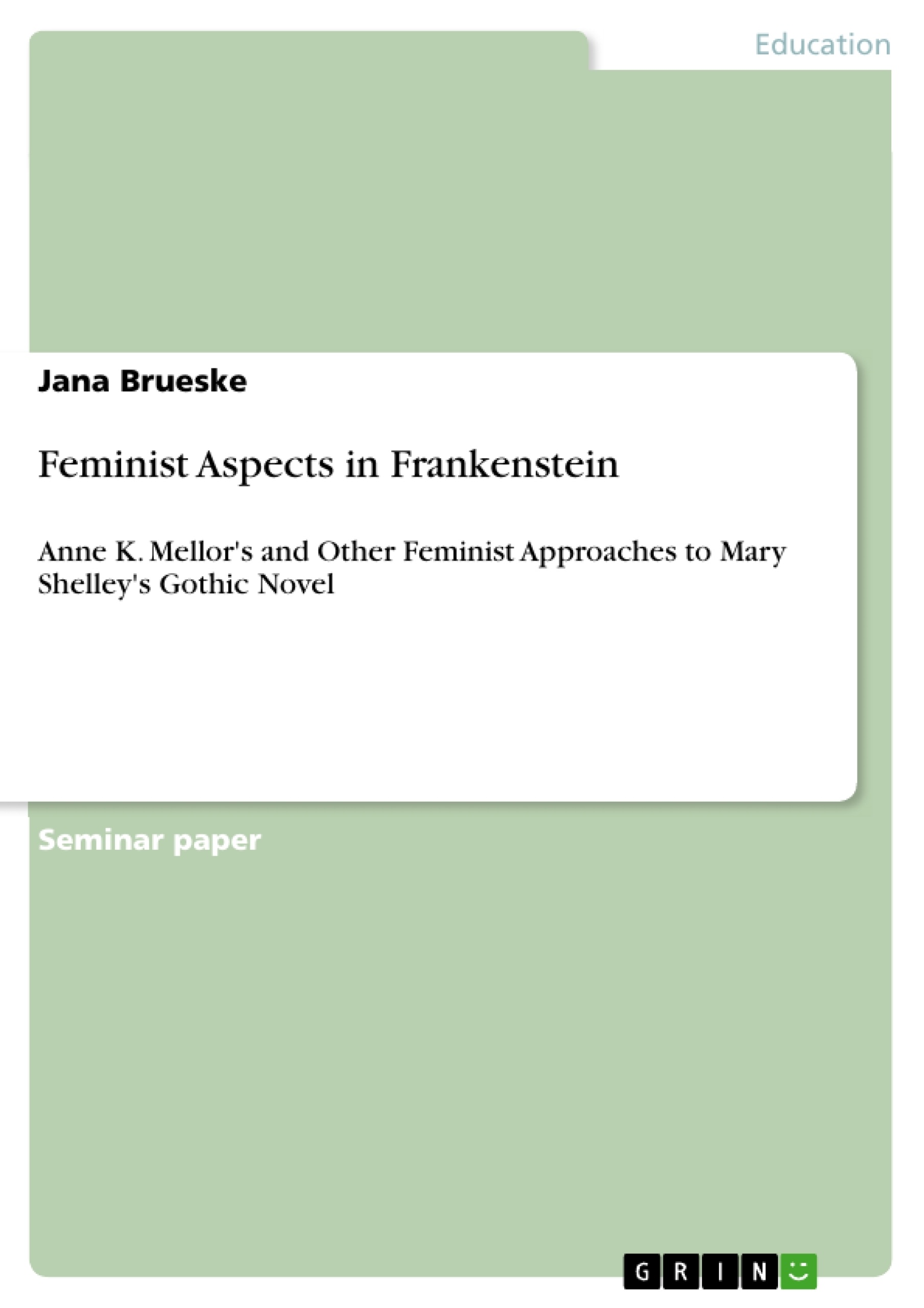The Gothic Novel Frankenstein by Mary Wollstonecraft Shelley (1797-1851) is the most famous of her literary works for it has been reissued, redefined and criticised regularly since its first publication in 1818.
Johanna Smith mirrors with her statement what many critics say about Frankenstein: They define Frankenstein not only as a Gothic Novel, but as a Feminist Novel as well. Some of the feminist literary critics say that “feminist interest in Frankenstein would throw light on the novel’s darkest passages” (Fischer et al 1993, 3), others claim it is an invocation on women’s rights in general. However, all of them agree on the fact that the novel underlines the repression of women in private and public and that it criticizes the patriarchal role and dominating position of men.
In this term paper I am aiming at pointing out the arguments of feminist literary critics that define Frankenstein as a feminist novel. In order to support the thesis of Frankenstein being a feminist novel, I first want to give a definition of Feminist Literary Criticism and its branches.
After having defined Mary Shelley as a feminist (or not) and having summarized what the movement was about, I want to go into detail analyzing Shelley’s Frankenstein in feminist terms.
In my analysis I will firstly put emphasis on Anne K. Mellor’s approach to Frankenstein. She not only gave with “Mary Shelley; Her Life, Her Fiction, Her Monsters (1988), the only full-length critical treatment of Shelley’s works in the 1980s” (Fisch et al 1993,8), but she also summarizes a lot of the arguments many feminist critics have mentioned in terms of interpreting Frankenstein. Mellor therefore provides a good basis for further examination.
Finally, in order to support and enlarge Mellor’s theory I want to introduce approaches by other critics treating the issue of feminism in Shelley’s work. These critics not only detail, object, and analyze Mellor’s statements, but they also add their own ideas. Thereby, it shall become clear if we can really label Frankenstein a Feminist Gothic Novel.
Table of Contents
- Introduction
- Feminist Criticism and Its Interest in Frankenstein
- Feminism and Feminist Criticism
- Frankenstein in Feminist Literary Criticism
- Mary Shelley – A Feminist?
- Anne K. Mellor's Feminist Approach to Frankenstein
- Mellor's arguments in other feminist critic approaches...
- Conclusion
Objectives and Key Themes
This paper aims to explore the arguments presented by feminist literary critics who consider Mary Shelley's novel "Frankenstein" a feminist text. The analysis focuses on the development of feminist literary criticism and its application to Shelley's work, with a particular emphasis on Anne K. Mellor's approach. The paper examines whether Mary Shelley herself intended to convey a feminist message in her novel.
- The evolution and different branches of feminist criticism
- Mary Shelley's potential feminist stance and influence
- Analysis of "Frankenstein" through the lens of feminist literary criticism
- Anne K. Mellor's interpretation of "Frankenstein" and its feminist implications
- Contributions of other feminist critics to the understanding of "Frankenstein" as a feminist text
Chapter Summaries
The first chapter introduces the concept of analyzing "Frankenstein" through a feminist lens, outlining the critical arguments that label it as a feminist novel. The second chapter provides an overview of the feminist movement and its various branches, including the first, second, and third waves of feminism. It also explores different perspectives on feminist literary criticism from American, British, and French feminists.
The third chapter explores the question of whether Mary Shelley herself intended to write a feminist novel. The following chapters delve deeper into analyzing "Frankenstein" through a feminist framework, focusing on Anne K. Mellor's approach and other feminist interpretations of the novel. The analysis aims to determine if "Frankenstein" can be definitively classified as a feminist gothic novel.
Keywords
Key terms and concepts explored in this paper include feminist criticism, feminist literary criticism, "Frankenstein," Mary Shelley, gothic novel, gender roles, women's rights, patriarchal structures, Anne K. Mellor, gynocriticism, l'écriture feminine, and feminist interpretations of literary texts.
- Quote paper
- Jana Brueske (Author), 2009, Feminist Aspects in Frankenstein , Munich, GRIN Verlag, https://www.grin.com/document/204983




